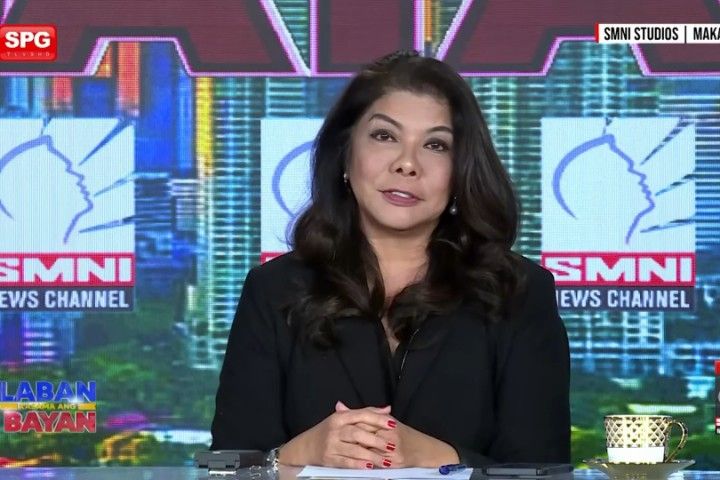Quiboloy network called out for 'abusing' franchise with red-tagging, personal attacks

MANILA, Philippines — A civil society coalition on Thursday called on government agencies and the Kapisanan ng mga Brodkaster ng Pilipinas to "investigate and to review" Sonshine Media Network International for allegedly violating the Broadcast Code of the Philippines through personal attacks and red-tagging of groups and individuals.
Red-tagging is defined in Philippine jurisprudence as "the act of labeling, branding, naming and accusing individuals and/or organizations of being left-leaning, subversives, communists or terrorists (used as) a strategy... by State agents, particularly law enforcement agencies and the military, against those perceived to be 'threats' or 'enemies of the State.'"
SMNI, owned by controversial preacher Apollo Quiboloy, was aligned with the Duterte administration and is supportive of the current Marcos presidency. Its personalities and content creators have maligned administration critics and independent media, often by baselessly accusing them of being part of the armed communist rebellion.
In a statement, the Movement Against Disinformation called the network out for "blatant red-tagging and attacking the persons of Maria Ressa and Rappler in the guise of delivering news to the public" when it insinuated that the news site was giving a platform to the Communist Party of the Philippines.
"SMNI and its presenters are not above the law in the exercise of their right to deliver information to the public. They are bound by law and the code of ethics of the KBP. They are legally, ethically and morally prohibited from red-tagging and putting in harm’s way the subjects of their news," MAD said.
"Mass media such as SMNI are highly regulated and are imbued with public interest because they disseminate information and ideas to the public which 'set the standards, ideals and aims of the masses,'" MAD's statement issued Thursday afternoon reads.
MAD, in its statement, included snippets from an SMNI program dated October 11 featuring a conversation between former Palace appoointee Lorraine Badoy-Partosa and Jeffrey Celiz, a former activist who claims to have been a former rebel.
RELATED: SC issues show-cause order vs Badoy over posts on Manila judge
"Just one more step for the conviction of Rappler operator for disinformation, misinformation, deception, and platform provider for the CPP NPA, Maria Ressa. We don't know if she is Filipino or what kind of person she is," Celiz is quoted as saying in mixed Filipino and English.
"And she's almost like the CPP-NPA; she's defaming the image of the Philippines. She's making her crimes seem like she's a political prisoner or that it's about freedom of expression," Badoy-Partosa says in response.
MAD called the exchange an "indubitable example of active seeding and peddling of disinformation, which not only assaults the integrity of Ressa and Rappler but more importantly violates SMNI’s mandate to the public to be a fair, objective and credible source of news and information."
READ: For Filipinos, fake news is a problem they blame on social media influencers
This also comes after private pollster Pulse Asia found in a recent survey that nearly nine out of 10 Filipinos believe that fake news is a problem in the country which a small majority of them blame on social media influencers, bloggers, and vloggers.
The Movement Against Disinformation pointed out that Republic Act No. 11422, the legislative franchise of SMNI, reads:
The grantee shall provide...at all times sound and balanced programming; promote public participation; assist in the functions of public information and education; conform to the ethics of honest enterprise; promote audience sensibility and empowerment including closed captioning; and not use its stations or facilities for the broadcasting of obscene or indecent language, speech, act, or scene; or for the dissemination of deliberately false information or willful misrepresentation, to the detriment of the public interest; or to incite, encourage, or assist in subversive or treasonable acts.
"The commentaries and opinions amplified by news presenters through mass media influence the hearts and minds of the people, and shape public opinion and discourse on issues and individuals. Their influence is so pervasive that they could not be left unchecked and unregulated," MAD also said.
The group also pointed to the Broadcast Code of the Philippines, which SMNI and its presenters are also bound to and which outlines standards of fairness and objectivity and prohibits personal attacks to be aired in its members' programs.
"The proliferation of fake news and disinformation is a very urgent public concern. It is time that the regulatory powers of the regulators be felt in full force to rein in and hold to account contumacious red-taggers and purveyors of disinformation and misinformation in the Philippines," MAD said.
"The Philippines remains a government of laws and not of men."
RELATED: Karapatan: Red-tagging is a threat, not simple freedom of expression
- Latest
- Trending































